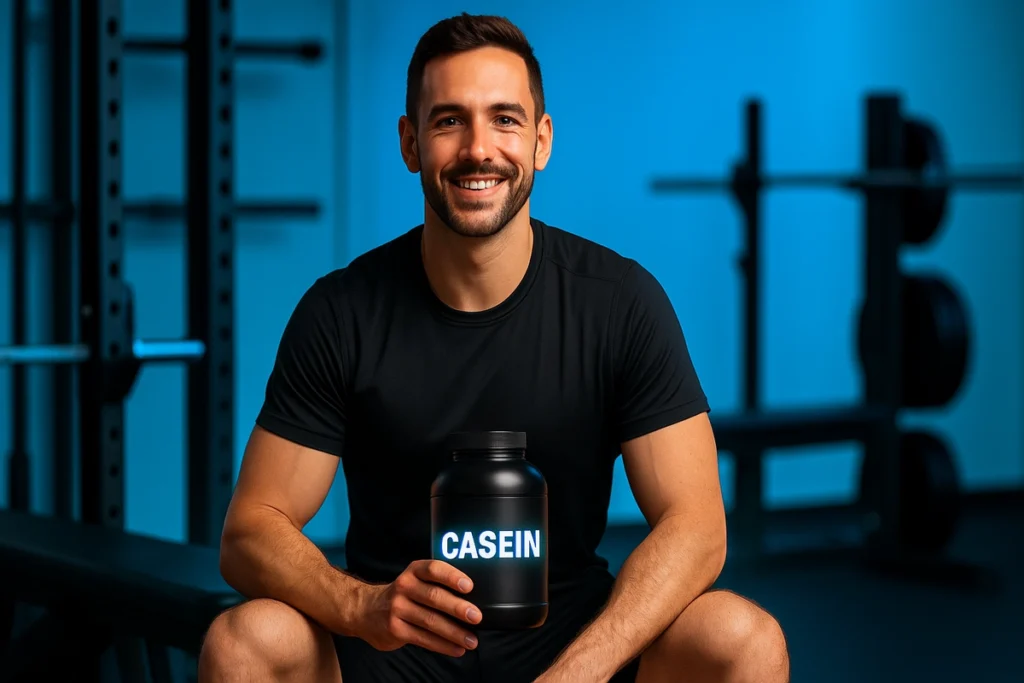Are you lactose intolerant but still want the muscle-building benefits of casein protein? You’re not alone—and yes, it can work for you.
Many of my clients with dairy sensitivity ask this exact question. The truth is, not all casein proteins are equal—and not all will upset your stomach.
In this guide, I’ll break down what works, what to avoid, and how to safely use casein without digestive issues. Let’s clear the confusion now.
Table of contents
Can Lactose Intolerant People Use Casein?

If you’re lactose intolerant and looking to boost your protein intake, you’re probably wondering: Can I take casein protein without getting bloated or uncomfortable?
The short answer: It depends on the type of casein you choose and your level of lactose sensitivity.
As a coach who’s worked with a wide range of clients—and personally used casein for years—I’m here to break it down in simple terms.
If you’re curious about how casein compares to other options, check out this deep dive on Casein vs Whey Isolate.
What Is Casein Protein?

Casein is a slow-digesting protein that comes from milk.
Unlike whey, which digests quickly, casein provides a steady release of amino acids over several hours. That’s what makes it such a popular choice for nighttime use and recovery-focused nutrition.
I’ve used casein myself during cutting phases to help reduce late-night hunger. It keeps you full longer and supports recovery while you sleep.
To understand its full muscle-building potential, you can explore the article on Casein for Lean Muscle.
Lactose Content in Different Types of Casein

Not all casein proteins are created equal—especially when it comes to lactose content.
- Micellar Casein is the most common form but can contain trace amounts of lactose.
- Casein Isolate is more filtered, typically lower in lactose, and often easier to digest.
One of my clients, Liam, who had mild lactose intolerance, struggled with whey but had zero issues after switching to casein isolate. That was a game-changer for his recovery and daily routine.
To dive deeper into how casein works overnight, read about its digestion time and benefits.
Is Casein Truly Lactose-Free?

Many casein products claim to be “low-lactose” or even “lactose-free.” But labels can be misleading if the brand isn’t third-party tested.
From experience, I’ve found that high-quality casein isolates are usually safe for most people with lactose sensitivity.
I once tried a cheap micellar brand and ended up bloated for hours. Lesson learned—quality matters.
Clients like Marco made the switch to brands like Dymatize Elite Casein or Kaged Kasein and noticed a huge difference. No more stomach cramps or discomfort.
Want to avoid the wrong pick? This list of the best casein protein powders can help you choose smart.
Best Casein Options for Sensitive Stomachs

If you’re sensitive to dairy, here’s what I suggest:
- Go for casein isolate or hydrolyzed casein
- Look for brands with third-party testing
- Avoid mixing with regular milk—use water, almond milk, or lactose-free milk
For my client Emma, we started with half a scoop of isolate mixed in almond milk. She had no issues and eventually made it a staple in her night routine.
And if casein still doesn’t sit well with you? Consider egg white protein or a clean plant-based blend. If you’re curious how casein compares to those, check out EAAs vs Protein Powder.
Signs Casein May Not Work for You

Even with low-lactose options, some people still react negatively.
Watch out for these symptoms:
- Bloating or gas
- Cramping
- Skin breakouts
- Fatigue after consuming
One client, Elena, had a more severe lactose intolerance. Even the cleanest casein isolate didn’t work for her.
We switched her to a plant-based protein, and she felt great within days. If you’re unsure whether casein is right for your body, this side effects guide may help you decide.
Final Verdict: Is Casein Right for You?

Here’s my honest take as a coach:
- If your lactose intolerance is mild and you choose a high-quality isolate, casein can be a fantastic tool—especially at night for recovery and satiety.
- If you’re highly sensitive, don’t risk it. Go with other lactose-free options.
Personally, I love how casein keeps me full and supports muscle preservation overnight. I often use it during cutting phases for that exact reason—more on that here: Casein for Cutting vs Bulking.
And if you’re curious about how much casein you actually need, this dosage guide will give you clear numbers.
Finally, if you’re someone who struggles with nighttime cravings or wants to recover better from training, don’t underestimate the power of a casein shake before bed. Read this piece on casein for overnight recovery for real impact.
Casein isn’t perfect for everyone—but when it works, it really works. Test it smart, listen to your body, and always go with quality.



Leave a Reply